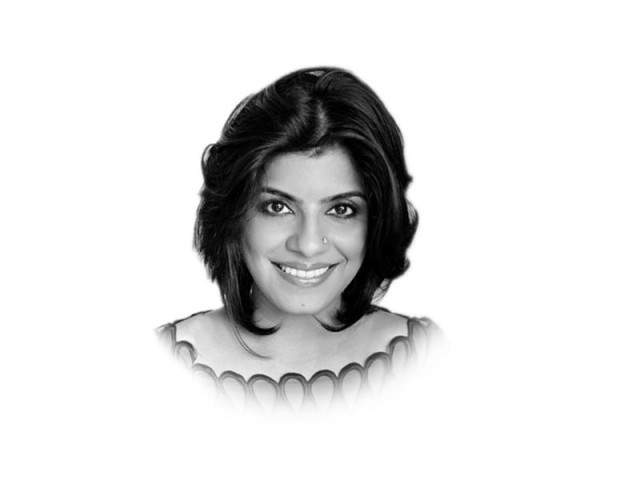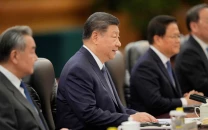India’s hate mongers
No matter how much parties claim to be different or represent common man they too yearn for communal vote banks.

The writer is an editor with Marie Claire International
A Shiv Sena leader whips a crowd into a frenzy by declaring that Muslims will be taught a lesson the moment Narendra Modi (who is sharing the dais with him) becomes prime minister. A Congress leader evokes a similar frenzy by threatening to physically harm Narendra Modi. A BJP leader declares that anybody who opposes Modi will have to go and live in Pakistan. An AAP leader, young articulate and well educated, berates Muslims for being too secular. It is time, she says, for Muslims to become communal.
Hate is not new to politics and communal hatred has long been a feature of Indian elections — just witness the number of communal clashes and riots that occur in the run-up to election season time after time. But there is something both scary and profoundly depressing about the manner in which hate has now taken centre stage in this campaign. It is no longer a question of miscreants disrupting a religious procession or of goondas on the fringes of our society hurling communal epithets at their rivals.
This time around, the hatred has entered the mainstream. The people, who spout communal venom, encourage communities to turn on each other, advocate violence or make threats about the future are not hoodlums who exist in some netherworld. Nearly all of them are mainstream politicians, people who get party tickets, who appear on TV channels to represent their political masters and in some cases, even people who are household names.
When did India change to the extent that hatred and communal vitriol became an acceptable part of our political dialogue? How can mainstream figures think it is okay to talk in this way? More worrying still, why are there silver-tongued party spokespersons who will appear on TV night after night to defend this kind of behaviour? And why are parties so reluctant to take action against those who vitiate the communal atmosphere? Most get away with a mere rap on the knuckles. Oh, we are distancing ourselves from their statements, party leaders declare. Or: what he said was against our tradition. Or even: these statements were irresponsible and petty.
Petty? Irresponsible? Asking someone to impose religious apartheid in India is petty? Threatening revenge on an entire community once your leader comes to power is just irresponsible? Encouraging your followers to physically wound the opposition’s prime ministerial candidate is merely something that is a little alien to the so-called Congress tradition of love? Is it okay to simply distance yourself from somebody who tells her community to abandon secularism and wholeheartedly embrace communalism?
The weak and feeble nature of these reprimands confirms what we have always suspected. Political parties recognise that hatred wins votes. No matter how much they claim to be different or to represent the common man they yearn for communal vote banks just as much as every other party. They want their candidates and their spokespeople to get the message out. And the candidates who know that their tickets will not be withdrawn and that they will suffer no sanction from their parties leap at the opportunity. Spreading hatred is a guaranteed route to political advancement these days.
It is easy to blame the political class for injecting so much hatred into the discourse. But our generation of Indians must also share the blame. Go on to any social media platform — Twitter is just one example — and look at the posts. The level of abuse, viciousness and hatred on display is unparalleled. Say what you will about our parents and their generation but they maintained a level of civility in their discourse. The hate mongers were kept at a distance and never allowed to swim in the political mainstream. But now we revel in abusing one another and wallow in hatred.
To a large extent, politicians are only reflecting the mood of the times. They know that hatred has taken over the conversation, both in social media and on news television where violent arguments are positively encouraged. They know that there is no better way of attracting attention than by spreading hatred. And we, in turn, allow them to get away with it because we have also forgotten how to be civil with one another. It is instructive how muted the public outrage over the low level of this election campaign is. Newspapers may still write angry editorials condemning hate speeches. But for the television channels, every personal attack, every vicious abuse and every communal campaign is no more than a good excuse for yet another raucous debate where angry panelists repeat the hate-filled statements even while feigning a bogus outrage. And on social media, tweeters and trolls treat the abuse and insults spewed by their leaders as an incentive to reach for even higher levels of hatred.
Can anything change this vitiated atmosphere? I hope we can find a way. But I remain pessimistic. A society that values TV quarrels and encourages Twitter trolls has no right to expect better from its politicians.
Published in The Express Tribune, May 6th, 2014.
Like Opinion & Editorial on Facebook, follow @ETOpEd on Twitter to receive all updates on all our daily pieces.


















COMMENTS
Comments are moderated and generally will be posted if they are on-topic and not abusive.
For more information, please see our Comments FAQ